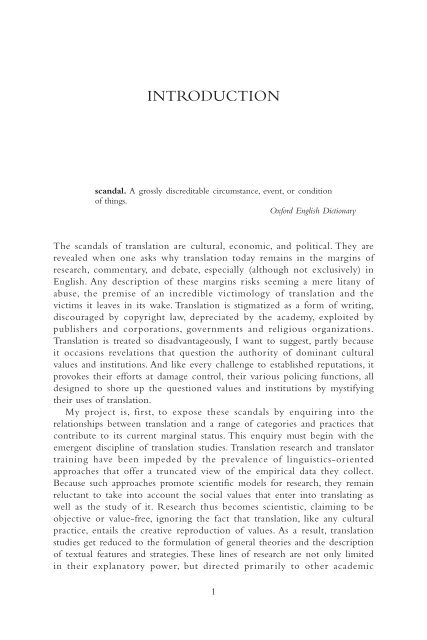INTRODUCTIONscandal. A grossly discreditable circumstance, event, or conditionof things.Oxford English DictionaryThe scandals of translation are cultural, economic, and political. They arerevealed when one asks why translation today remains in the margins ofresearch, commentary, and debate, especially (although not exclusively) inEnglish. Any description of these margins risks seeming a mere litany ofabuse, the premise of an incredible victimology of translation and thevictims it leaves in its wake. Translation is stigmatized as a form of writing,discouraged by copyright law, depreciated by the academy, exploited bypublishers and corporations, governments and religious organizations.Translation is treated so disadvantageously, I want to suggest, partly becauseit occasions revelations that question the authority of dominant culturalvalues and institutions. And like every challenge to established reputations, itprovokes their efforts at damage control, their various policing functions, alldesigned to shore up the questioned values and institutions by mystifyingtheir uses of translation.My project is, first, to expose these scandals by enquiring into therelationships between translation and a range of categories and practices thatcontribute to its current marginal status. This enquiry must begin with theemergent discipline of translation studies. Translation research and translatortraining have been impeded by the prevalence of linguistics-orientedapproaches that offer a truncated view of the empirical data they collect.Because such approaches promote scientific models for research, they remainreluctant to take into account the social values that enter into translating aswell as the study of it. Research thus becomes scientistic, claiming to beobjective or value-free, ignoring the fact that translation, like any culturalpractice, entails the creative reproduction of values. As a result, translationstudies get reduced to the formulation of general theories and the descriptionof textual features and strategies. These lines of research are not only limitedin their explanatory power, but directed primarily to other academic1
INTRODUCTIONspecialists in linguistics, instead of translators or readers of translations or evenspecialists in other humanistic disciplines. In the end, translation suffers froman institutional isolation, divorced from the contemporary culturaldevelopments and debates that invest it with significance.By far the greatest hindrances to translation, however, exist outside thediscipline itself. Translation is degraded by prevalent concepts of authorship,especially in literature and in literary scholarship, and these conceptsunderwrite its unfavorable definition in copyright law, not only the codes ofspecific national jurisdictions, but the major international treaties. Translationlies deeply repressed in the cultural identities that are constructed byacademic, religious, and political institutions; in the pedagogy of foreignliteratures, notably the “Great Books,” the canonical texts of Western culture;and in the discipline of philosophy, the academic study of philosophicalconcepts and traditions. Translation figures hugely in the corporate world, inthe international publishing of bestsellers and the unequal patterns of crossculturalcommerce between the hegemonic Northern and Western countriesand their others in Africa, Asia, and South America. Translation powers theglobal cultural economy, enabling transnational corporations to dominate theprint and electronic media in the so-called developing countries bycapitalizing on the marketability of translations from the major languages,preeminently English. “Developing” here means no more than a backwardrelation to world capitalism. Translation embarrasses the institutions that housethese categories and practices because it calls attention to their questionableconditions and effects, the contradictions and exclusions that make thempossible—and discredit them.The scandals may appear where we least expect them. The April 1990 issueof the Courier, a monthly magazine published by UNESCO to promoteintercultural understanding, ran an article—in its Spanish and Englisheditions—that presented a history of Mexican peoples. The English translationis extraordinary for its ideological slanting against pre-Columbian Mexicans,whose oral culture is represented as inferior, especially as a repository of thepast (Mason 1994; cf. Hatim and Mason 1997:153–159). Thus, “antiguosmexicanos” (“ancient Mexicans”) is rendered as “Indians,” distinguishingthem sharply from their Spanish colonizers; “sabios” (“wise men”) as“diviners,” opposing them to European rationalism; and “testimonias”(“testimonies”) as “written records,” subtly privileging literary over oraltraditions. The most recurrent term in the Spanish text, “memoria,” a crucialfaculty for the oral transmission of culture, is translated variously as “history”and “knowledge of the past,” as well as “memory.” In the following sentence,the translation has edited the Spanish, diminishing the indigenous culture bysimplifying the syntax and deleting another key term, “mitos” (“myths”):Los mitos y leyendas, la tradición oral y el gran conjunto deinscripciones perpetuaron la memoria de tales aconteceres.2


